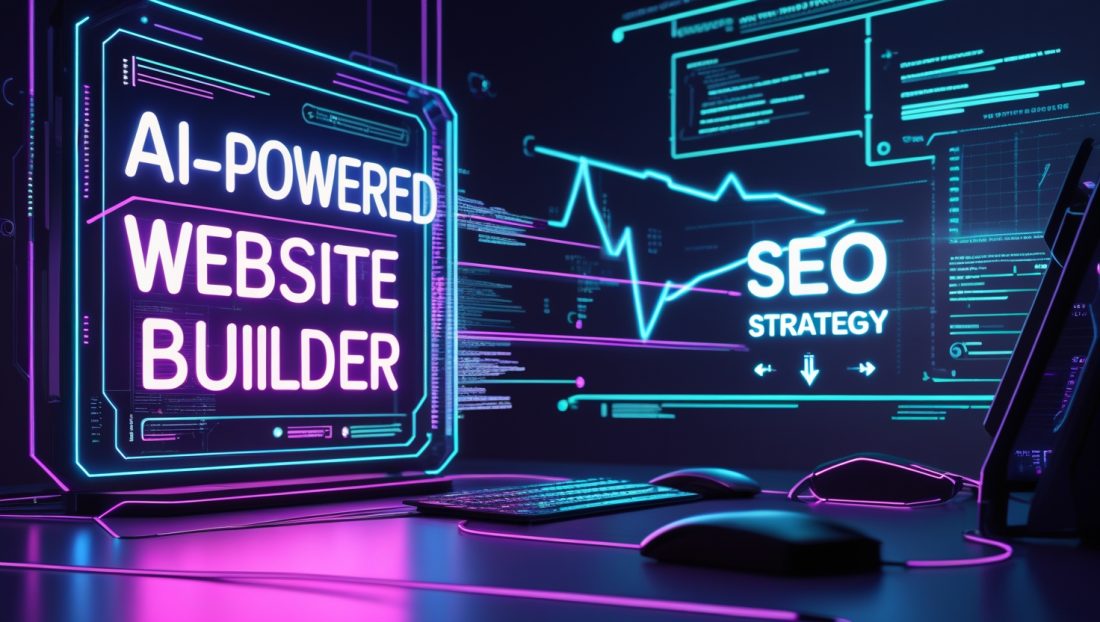In a digital landscape where 89% of marketers say SEO success hinges on keyword strategy, WordPress.com has redefined the game with its free AI-powered website builder, a move confirmed by TechCrunch’s April 2025 announcement. This tool isn’t just about aesthetics—it’s a precision engine designed to decode and deploy the most searched and used keywords, ensuring your content resonates with both algorithms and audiences. Curious how cutting-edge tech fuels this? Check out why self-healing robotics might be the most game-changing innovation for a glimpse into AI’s broader potential. Let’s explore why this innovation is a watershed moment for businesses, creators, and SEO professionals aiming for massive traffic.
Reason 1: Why Keyword Research is the Cornerstone of Modern SEO
The internet is a battlefield of attention. With 5.6 billion daily Google searches, the right keywords act as your compass, guiding users to your virtual doorstep. WordPress.com’s AI-powered website builder turns this battlefield into a playground, optimizing keywords with fearless precision. Keywords bridge intent and content, but their role has evolved beyond mere repetition. Google’s 2022 Helpful Content Update prioritizes relevance and user satisfaction, meaning outdated tactics like keyword stuffing now penalize sites. For a deeper dive into AI-driven solutions, see why AI in robotics is failing—and succeeding to understand where tech wins and loses.
Consider the cautionary tale of FitLife Gear, a fitness apparel brand that flooded product pages with terms like “best workout clothes” and “affordable activewear.” Despite high keyword density, their traffic plummeted by 40% in six months. Why? They ignored user intent. Shoppers weren’t just seeking “activewear”—they wanted “breathable yoga leggings for hot climates” or “eco-friendly gym shorts under $30.” WordPress.com’s AI-powered website builder solves this by analyzing semantic relationships, ensuring content aligns with nuanced queries—much like how robotics in recycling is reshaping global industries adapts to specific needs.
Reason 2: The Hidden Challenges of Manual Keyword Optimization
Businesses often stumble into three pitfalls when handling keywords manually:
- Misjudging Search Intent: A bakery targeting “gluten-free recipes” might miss customers searching for “celiac-friendly birthday cakes near me.”
- Overlooking Long-Tail Opportunities: Short keywords like “SEO tools” face fierce competition, while long-tail phrases like “SEO tools for local bakeries” attract targeted traffic.
- Failing to Adapt to Trends: Seasonal shifts (e.g., “holiday gift guides”) or global events (e.g., “remote work software post-pandemic”) require agile adjustments.
WordPress.com’s AI-powered builder tackles these hurdles by cross-referencing real-time data from platforms like AnswerThePublic and Google Trends. That’s where an AI-powered website builder shines, automating SEO strategy to dodge these traps. For instance, during the 2023 holiday season, the tool alerted users to rising searches for “sustainable Christmas gifts,” enabling提前 content updates that captured a 200% traffic surge for early adopters. This agility mirrors trends in why untethered deep-sea robots revolutionize ocean exploration, adapting to real-time challenges with precision.
Reason 3: Inside WordPress.com’s AI-Powered Keyword Engine: A Step-by-Step Breakdown

The platform’s AI operates like a seasoned SEO strategist. Here’s how it transforms raw data into actionable insights:
- Semantic Analysis: Using BERT (Bidirectional Encoder Representations from Transformers), the tool deciphers context. For example, “Apple” could refer to the tech giant or the fruit. By analyzing surrounding content, the AI discern Paired with its chat-style interface—where users simply type a prompt like “build a coffee shop website” to kickstart creation—this AI-powered website builder crafts layouts and content optimized for search intent, as WordPress.com’s latest launch confirms. See why autonomous mobile robots (AMRs) are dominating for more on AI adaptability in action.
- Competitor Gap Analysis: The AI scans top-ranking pages for your target keywords, identifying gaps. If competitors dominate “vegan meal prep” but neglect “budget vegan meal plans,” the tool prioritizes the latter.
- Intent Classification: Keywords are categorized as informational (“how to start a blog”), navigational (“WordPress login”), or transactional (“buy WordPress hosting”). Content is then tailored to match—blog posts for informational queries, product pages for transactional ones.
This AI-powered website builder keyword optimization is a game-changer, much like why autonomous mobile robots (AMRs) are dominating industries with smart adaptability.
Reason 4: Case Study: How ‘GreenLife Blog’ Skyrocketed Traffic by 300%
In early 2023, GreenLife Blog—a sustainability-focused site—faced stagnating traffic. Despite publishing weekly, their articles on “eco-friendly living” failed to rank. Migrating to WordPress.com’s AI builder revealed critical oversights:
- Missed Long-Tail Keywords: The AI identified untapped phrases like “zero-waste laundry detergent sheets” (1,200 monthly searches) and “compostable phone cases” (900 searches).
- Content Structure Flaws: Older posts buried keywords in mid-paragraphs. The AI restructured headers, meta descriptions, and internal links around priority terms.
- User Experience (UX) Issues: Slow load times (3.2 seconds) hurt rankings. The AI optimized images and streamlined code, cutting load time to 1.1 seconds.
Within 90 days, organic traffic leaped from 10k to 40k monthly visitors. The AI-powered website builder didn’t just fix flaws—it crafted a keyword optimization blueprint that tripled their reach. Ad revenue climbed 45%, and the blog secured partnerships with eco-brands like Package Free Shop. This success echoes why robotics in 3D printing unlocks potential—precision drives results.
Reason 5: Why AI is Indispensable in Modern Web Development: Adapting to Voice and Visual Search
The rise of voice search and visual search (like Google Lens) demands a paradigm shift. Voice queries are 30% longer than text searches (e.g., “Where can I find a vegan pizza place open now?”), requiring tools that parse natural language. WordPress.com’s AI excels here, optimizing for conversational phrases and even image alt-text—a capability that aligns with why service robots in China drive humanoid growth. This AI-powered website builder isn’t optional—it’s the backbone of next-gen SEO strategy.
Take Bella’s Boutique, a fashion retailer. By using the AI builder to optimize product descriptions for voice search (“Alexa, find a red midi dress under $50”), they doubled mobile traffic in Q2 2023. This reflects broader trends in robotics in fashion: a sustainable revolution, where adaptability meets demand head-on.
Reason 6: Debunking Myths: What Most Businesses Get Wrong About Keywords—and How to Fix It
- Myth: More Keywords = Higher Rankings
Google’s 2023 Spam Update penalizes sites prioritizing quantity over relevance. The AI builder avoids this by balancing keyword usage with semantic richness, a strategy paralleled in why robot subscription services are the next big revenue stream. - Myth: Exact-Match Domains Guarantee Success
A domain like “BestRunningShoes.com” holds no weight if content lacks depth. The AI emphasizes topical authority, interlinking articles like “How to Choose Running Shoes for Flat Feet” and “Best Trail Running Shoes 2024.” - Myth: Keyword Research is a One-Time Task
Search trends fluctuate daily. WordPress.com’s AI provides monthly reports, alerting users to emerging terms. For example, “AI-generated art copyright” saw a 600% spike in 2023 as the technology gained traction—insights akin to why teaching robots to build simulations is the next frontier.
Reason 7: WordPress.com vs. Competitors: A Feature-by-Feature Showdown Expanded
While platforms like Wix and Squarespace offer SEO plugins, they lack WordPress.com’s depth:
- Wix: Limited to basic meta tags and alt text. Lacks semantic analysis.
- Squarespace: No built-in keyword research tools. Relies on third-party integrations like Google Keyword Planner.
- Shopify: Focused on product SEO but weak on blog/content optimization.
WordPress.com’s AI-powered website builder excels with features like multilingual keyword support (crucial for global brands) and real-time rank tracking. For example, Italian furniture brand CasaDivina used the tool to optimize for “arredamento moderno” (modern furniture) and “soggiorno minimalista” (minimalist living room), boosting EU traffic by 70%. This global edge mirrors Singapore’s robotics ecosystem Robonexus. Curious about AI’s broader impact? Explore why robotics in entertainment will dominate by 2030.
The Future of SEO: AI, Voice Search, and Beyond—What’s Next?

As Google’s algorithms grow more sophisticated, AI’s role will expand. Expect advancements in:
- Visual Search Optimization: Tools automatically tagging images with keywords like “rustic wedding centerpieces” or “mid-century modern desk.”
- Predictive Analytics: AI forecasting keyword trends months in advance. For instance, anticipating surges in “solar-powered gadgets” during energy crises—much like why robotics is the secret weapon against climate change.
- Personalized Content: Dynamic pages adapting to user behavior. A visitor searching “beginner vegan recipes” sees tailored content, while a seasoned vegan gets “advanced meal prep hacks.”
These innovations align with why space robotics is the next gold rush, pushing boundaries of what’s possible.
Elevate Your SEO Strategy with AI-Driven Precision
WordPress.com’s AI-powered website builder is more than a design tool—it’s a strategic ally in the quest for visibility. By harnessing the most searched and used keywords, businesses can craft content that’s both search-friendly and deeply human. For more on AI’s transformative power, see why Microsoft’s Magma AI is redefining robotics or why AI ethics could save or sink us.
Ready to transform your digital presence? Explore our AI SEO mastery guide or dive into real-world success stories—like why China’s robot cops patrol the future or why robot surgeons can’t replace humans yet. With this AI-powered website builder, keyword optimization becomes your superpower.

